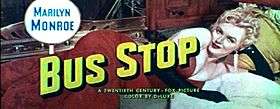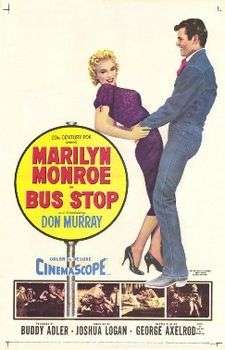Bus Stop (1956 film)
| Bus Stop | |
|---|---|
|
| |
| Directed by | Joshua Logan |
| Produced by | Buddy Adler |
| Written by |
George Axelrod William Inge |
| Starring |
Marilyn Monroe Don Murray Arthur O'Connell Betty Field Eileen Heckart |
| Music by |
Ken Darby Cyril J. Mockridge Alfred Newman Lionel Newman |
| Cinematography | Milton R. Krasner |
| Edited by | William H. Reynolds |
| Distributed by | 20th Century Fox |
Release dates |
|
Running time | 96 minutes |
| Country | United States |
| Language | English |
| Budget | $2.2 million[1] |
| Box office | $7.27 million[2] |
Bus Stop is a 1956 American romantic comedy film directed by Joshua Logan for 20th Century Fox, starring Marilyn Monroe, Don Murray, Arthur O'Connell, Betty Field, Eileen Heckart, Robert Bray and Hope Lange.
Unlike most of Monroe's movies, Bus Stop is neither a full-fledged comedy nor a musical, but rather a dramatic piece; it was the first film she appeared in after studying at the Actors Studio in New York. Monroe does however sing one song: "That Old Black Magic" by Harold Arlen and Johnny Mercer.
Bus Stop was based on two plays by William Inge, People in the Wind and Bus Stop. The inspiration for the play Bus Stop came from people Inge met in Tonganoxie, Kansas.[3]
In the 1961–62 season, ABC adapted the play and film into a television series of the same name, Bus Stop starring Marilyn Maxwell as the owner of the bus station and diner. In the segment "Chérie" which most closely follows the film, Tuesday Weld performed the role of Marilyn Monroe, and Gary Lockwood appeared as the Don Murray character.
The film was shot in Idaho and Arizona.[4]
Plot

A naive, rambunctious, overly enthusiastic and socially inept cowboy, Beauregard Decker, and his friend and father-figure Virgil Blessing take the bus from Timber Hill, Montana to Phoenix, Arizona, to participate in a rodeo. Virgil has encouraged the 21-year-old virgin, Beau, to take an interest in "girls." Initially reluctant and frightened of the idea, Beau declares that he hopes to find an "angel" and will know her when he sees her. Making trouble everywhere they go, he continues his bad behavior in the Blue Dragon Café. There he imagines himself in love with the café's singer, Chérie, a talentless but ambitious performer from the Ozarks with aspirations of becoming a Hollywood star. Her rendition of "That Old Black Magic" entrances him and he forces her outside, despite the establishment's rules against it, kisses her and thinks that means they're engaged. Chérie is physically attracted to him but resists his plans to take her back to Montana. She has no intention of marrying him and tells him so, but he's too stubborn to listen.
The next day, Beau intends to marry Chérie after the rodeo, but she escapes. He tracks her down, and forces her on the bus back to Montana. On the way, they stop at Grace's Diner, the same place the bus stopped on the way to Phoenix. Chérie tries to make another getaway while Beau is asleep on the bus, but the road ahead is blocked by snow and the bus won't be leaving at all. They're all stranded there. The bus driver, the waitress and the café owner by now all have learned that Beau is kidnapping and bullying the girl. Virgil and the bus driver fight him until he promises to apologize to Chérie and leave her alone. He, however, is unable to do so because he's humiliated about having been beaten.

The next morning, the storm has cleared and everybody is free to go. Beau finally apologizes to Chérie for his abusive behavior and begs her forgiveness. He wishes her well and prepares to depart without her. Chérie approaches him and confesses that she's had many boyfriends and is not the kind of woman he thinks she is. Beau confesses his lack of experience to her. Beau asks to kiss her goodbye and they share their first real kiss. All Chérie wanted from a man was respect, which she'd previously told the waitress when they sat together on the bus. This new Beau attracts Chérie. He accepts her past and this gesture touches her heart. She tells him she'll go anywhere with him. Virgil decides to stay behind. When Beau tries to coerce him to go with them, Chérie reminds him that he can't force Virgil to do what he wants. Having finally apparently learned his lesson, Beau offers Chérie his jacket and gallantly helps her onto the bus.
Cast
- Marilyn Monroe as Chérie
- Don Murray as Beauregard Decker
- Arthur O'Connell as Virgil Blessing
- Betty Field as Grace
- Eileen Heckart as Vera
- Robert Bray as Carl
- Hope Lange as Elma Duckworth
- Hans Conried as Life Magazine Photographer
- Casey Adams as Life Magazine Reporter
Soundtrack
| Song[5] | Performer(s) | Note(s) |
|---|---|---|
| "The Bus Stop Song" | Sung off-screen by The Four Lads Also sung by the bus passengers |
- |
| "That Old Black Magic" | Sung by Marilyn Monroe | - |
| "The Right Kind" | - | Music by Lionel Newman Lyrics by Don George and Charles Henderson |
| "Rye Whisky" | - | Written by Tex Ritter |
Award nominations
| Date of ceremony | Award | Category | Nominees | Result |
|---|---|---|---|---|
| 1957 | British Academy Film Awards | Most Promising Newcomer to Leading Film Roles | Don Murray | Nominated |
| February 3, 1957 | Directors Guild of America Award | Outstanding Directorial Achievement in Motion Pictures | Joshua Logan | Nominated |
| February 28, 1957 | Golden Globe Awards | Best Motion Picture – Musical or Comedy | Bus Stop | Nominated |
| Best Actress in a Motion Picture – Comedy or Musical | Marilyn Monroe | Nominated | ||
| March 27, 1957 | Academy Awards | Best Supporting Actor | Don Murray | Nominated |
See also
References
Notes
- ↑ Solomon, Aubrey. Twentieth Century Fox: A Corporate and Financial History (The Scarecrow Filmmakers Series). Lanham, Maryland: Scarecrow Press, 1989. ISBN 978-0-8108-4244-1. p250
- ↑ 'The Top Box-Office Hits of 1956', Variety Weekly, January 2, 1957
- ↑ www.broadway.tv article, "William Inge’s Broadway Demons"
- ↑ IMDb.com – Bus Stop – filming locations accessed 2008-04-28
- ↑ "Bus Stop (1956): Soundtracks". IMDb. Retrieved November 7, 2014.
External links
| Wikimedia Commons has media related to Bus Stop (film). |
- Bus Stop at the Internet Movie Database
- Bus Stop at AllMovie
- Bus Stop at the TCM Movie Database
- Bus Stop at Rotten Tomatoes
- Bus Stop at the American Film Institute Catalog
- Description of the Seeburg Model 146 Jukebox in the Bus Stop
